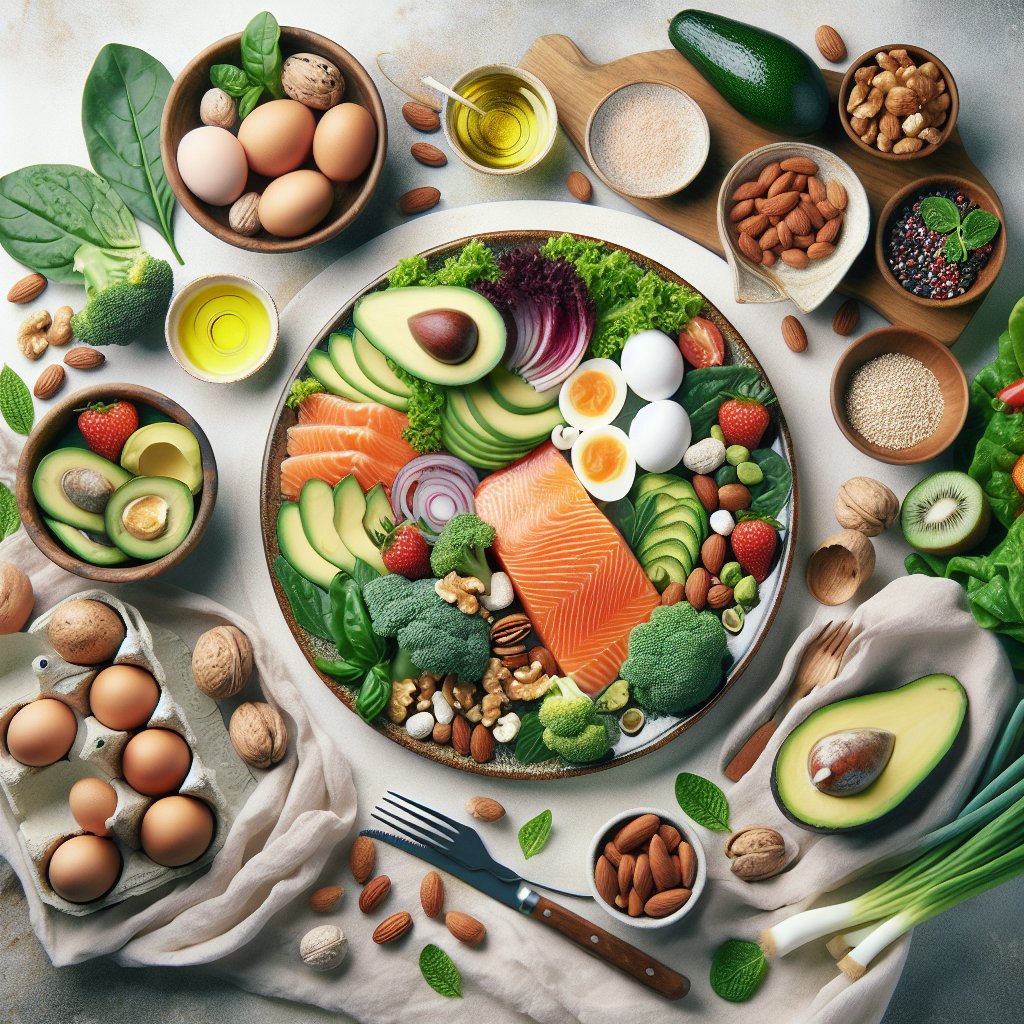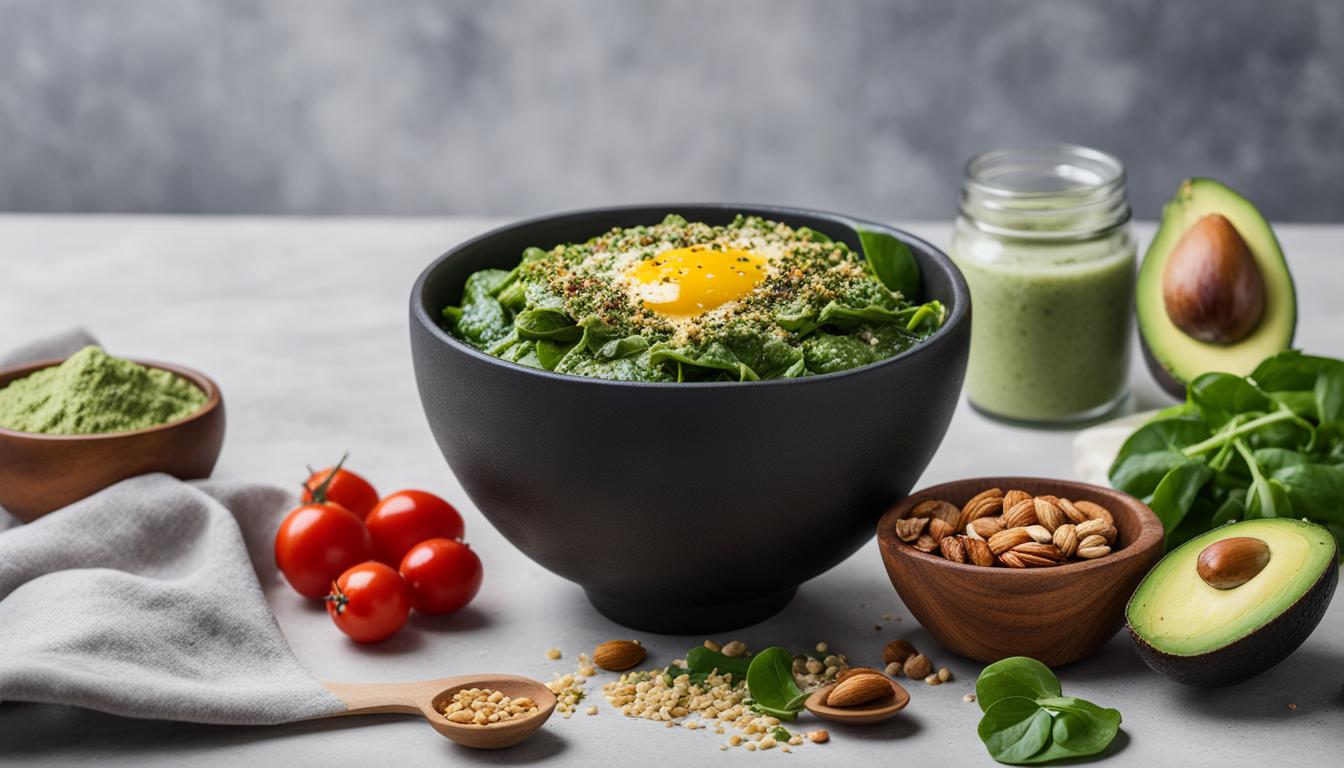Keto Start: Uncover the Basics and Benefits of the Keto Diet!
Uncover the Basics and Benefits of the Keto Diet!
Welcome to the world of the ketogenic diet! If you’re curious about keto and its potential benefits, you’re in the right place. Whether you’re a beginner or well-versed in this lifestyle, there’s always more to learn and explore.
Understanding the Basics of the Keto Diet
So, what exactly is the keto diet? In simple terms, it’s a high-fat, adequate-protein, and low-carbohydrate eating plan. The primary goal is to shift the body’s metabolism away from glucose and toward fat utilization and the production of ketone bodies. This metabolic state, known as ketosis, offers a range of health benefits that we’ll delve into shortly.
By drastically reducing your carb intake and replacing it with healthy fats, your body enters a state of ketosis. This means it becomes incredibly efficient at burning fat for energy. In addition, the reduction in carbs leads to lower blood sugar and insulin levels, making it an effective diet for weight loss and type 2 diabetes management.
The Benefits of the Keto Diet
Research has shown that following a ketogenic diet can lead to various benefits, including weight loss, improved blood sugar control, enhanced mental focus, and increased energy levels. Plus, it has been found to be effective in reducing risk factors for heart disease, such as high cholesterol and blood pressure.
Furthermore, the keto diet has shown promising results in managing conditions like epilepsy, polycystic ovary syndrome (PCOS), and even certain types of cancer. It’s truly remarkable how this way of eating can positively impact overall health and well-being.
Are you ready to take the first step on your keto journey? Let’s dive into the specifics and uncover more about this fascinating lifestyle!

What is the Keto Diet?
The ketogenic diet, or “keto” for short, is a high-fat, moderate-protein, and low-carbohydrate diet that has gained immense popularity in recent years. The primary goal of the keto diet is to shift the body’s metabolism from using carbohydrates as its primary fuel source to using fats, a metabolic state known as ketosis.
When the body enters ketosis, it becomes remarkably efficient at burning fat for energy, leading to weight loss and various other health benefits. The reduction of carbohydrates forces the body to rely on ketones, which are produced in the liver from the breakdown of fat.
The science behind the keto diet is fascinating. Studies have shown that when the body is in ketosis, it becomes an efficient fat-burning machine,
[1] leading to significant reductions in body weight and body mass index (BMI).
Additionally, the keto diet has been linked to improved blood sugar control,
[2] enhanced mental clarity, increased energy levels, and even a reduction in the risk of certain chronic conditions.
It’s essential to note that the keto diet is not a one-size-fits-all approach, and individual experiences may vary. However, the underlying biochemistry of ketosis and its potential benefits make it an intriguing option for many individuals looking to improve their health and wellness.
Ready to uncover more about the keto diet and how to kickstart your journey? Let’s dive into the basics and benefits to help you embrace the keto lifestyle!
[1] https://www.ncbi.nlm.nih.gov/pmc/articles/PMC2716748/
[2] https://pubmed.ncbi.nlm.nih.gov/23651522/
Tips and Guidelines for Starting the Keto Diet
Embarking on a ketogenic diet can be both exciting and challenging, but with the right approach, it can be immensely rewarding. Here are some tips and guidelines to help you get started on your keto journey.
Educate Yourself
Before diving in, take some time to educate yourself about the ketogenic diet. Understanding the science behind it and how it works in the body will give you a solid foundation for success.
Plan Your Meals
Meal planning is crucial for a successful keto experience. Research keto-friendly recipes, stock up on essential ingredients, and prepare your meals in advance to avoid the temptation of high-carb alternatives.
Focus on Whole Foods
Base your meals around whole, nutrient-dense foods such as leafy greens, low-carb vegetables, lean proteins, and healthy fats. This approach will not only support your nutritional needs but also keep you feeling satisfied.
Gradually Reduce Carbs
Transitioning to a low-carb lifestyle can be jarring for some. To ease into it, gradually reduce your carbohydrate intake over a week or two. This may help minimize the potential discomfort of the “keto flu” as your body adjusts to using fat for fuel.
Stay Hydrated and Replenish Electrolytes
As your body shifts into ketosis, it excretes more water and electrolytes. Make sure to stay well-hydrated and replenish your electrolyte levels by consuming foods rich in potassium, magnesium, and sodium.
By following these tips and guidelines, you can set yourself up for a successful and enjoyable start to the keto diet.
Benefits of Keto
So, you’ve heard about the ketogenic diet, but you’re not quite sure what all the fuss is about. Well, let me tell you, the benefits of following a keto diet are truly remarkable! There’s a wealth of research supporting the positive impact of this lifestyle on your overall well-being.
Weight Loss and Appetite Control
One of the most well-known benefits of the keto diet is its effectiveness in weight loss. Research published in The American Journal of Clinical Nutrition found that individuals following a ketogenic diet lost significantly more weight than those on a low-fat diet. The low-carb, high-fat nature of keto also helps control appetite, making it easier to cut calories without feeling deprived.
Improved Mental Focus and Clarity
Following a keto diet can lead to enhanced mental focus and clarity. Studies have shown that when the body relies on ketones for fuel instead of glucose, mental cognition can improve. This is because ketones provide a more consistent source of energy to the brain, leading to improved concentration and cognitive function.
Stabilized Blood Sugar Levels
For individuals with type 2 diabetes or those at risk for the condition, the keto diet can be incredibly beneficial. Research in the journal Diabetes Therapy indicates that the keto diet can lead to significant improvements in glycemic control and a reduction in medication usage for individuals with type 2 diabetes.
Improved Heart Health
Contrary to popular belief, the keto diet can also have a positive impact on heart health. A study published in the American Journal of Clinical Nutrition found that the keto diet can lead to improved levels of HDL cholesterol (the “good” cholesterol) and decreased levels of LDL cholesterol (the “bad” cholesterol).
These are just a few of the incredible benefits that come with adopting a ketogenic lifestyle. The impact it can have on overall health and well-being is truly astounding!
Foods to Eat on Keto
Embarking on a keto journey can be an exciting and transformative experience. One of the first steps to success is understanding which foods are allowed on a ketogenic diet. It’s not just about cutting out carbs, but also about embracing a wide variety of delicious and healthy options. Here’s a list of essential foods to eat on a keto diet to help you get started on the right foot.
1. Healthy Fats
Healthy fats are the cornerstone of a keto diet. These include avocados, fatty fish like salmon and mackerel, olive oil, coconut oil, and grass-fed butter. In addition to being delicious, these fats help promote satiety and support ketosis, the metabolic state essential for a ketogenic diet.
2. Low-Carb Vegetables
Non-starchy vegetables such as spinach, kale, broccoli, cauliflower, and zucchini are excellent choices for a keto diet. Packed with essential nutrients, fiber, and low in carbohydrates, they are perfect for maintaining a healthy and balanced ketogenic lifestyle.
3. High-Quality Proteins
Opt for high-quality, lean proteins like chicken, turkey, beef, and eggs. These foods not only provide essential nutrients but also play a crucial role in maintaining muscle mass during weight loss on the keto diet.
4. Nuts and Seeds
Nuts and seeds like almonds, walnuts, and chia seeds are excellent sources of healthy fats, fiber, and micronutrients. They make for convenient and nutritious keto-friendly snacks.
By incorporating these essential foods into your daily keto regime, you’ll find that there’s an abundance of delicious and satisfying options to fuel your body and mind.

Foods to Avoid on Keto
When starting on the keto diet, it’s important to be mindful of the foods that can impede your progress and prevent you from reaching a state of ketosis. Here are some foods to avoid:
1. Sugary Foods
High-sugar foods such as candy, cake, and ice cream should be eliminated from your diet. Research has shown that a high intake of sugar can lead to insulin resistance, making it harder for your body to enter ketosis (Johnston, et al., 2008).
2. Starchy Foods
Foods like bread, pasta, rice, and potatoes are high in carbohydrates, which can hinder ketosis. Research suggests that reducing starchy foods can lead to rapid weight loss and improved insulin sensitivity (Maki, 2007).
3. Processed Foods
Processed foods often contain hidden sugars and unhealthy fats. Studies have found that a high consumption of processed foods is associated with obesity and an increased risk of metabolic syndrome (Mozaffarian, et al., 2012).
By avoiding these foods and focusing on a diet rich in healthy fats, moderate in protein, and low in carbohydrates, you can kickstart your journey into ketosis and reap the numerous benefits of the keto diet.
Meal Planning on Keto
Planning your meals and snacks while on a ketogenic diet is vital for success. You want to ensure that you’re consuming the right balance of macronutrients to stay in ketosis. Here are some practical tips to help you plan your meals and snacks on a keto diet:
1. Know Your Macros
Understanding your macronutrient needs is crucial. The standard keto diet typically consists of 70-75% fat, 20-25% protein, and 5-10% carbohydrates. Plan your meals and snacks around these ratios to maintain ketosis.
2. Incorporate Quality Foods
Focus on incorporating high-quality, nutrient-dense foods into your meal plan. Opt for healthy fats like avocados, olive oil, and nuts. Include moderate protein sources such as fish, poultry, and tofu. Choose low-carb vegetables like leafy greens, broccoli, and cauliflower.
3. Prepare in Advance
Set aside time for meal prep. Cook protein in batches, chop vegetables, and portion snacks ahead of time. Having keto-friendly options readily available makes it easier to stick to your diet, especially during busy days.
By being mindful of your macros, choosing quality foods, and preparing in advance, you can set yourself up for success on a keto diet.
Tips for Staying Motivated and Consistent on the Keto Diet
Starting on the keto diet can be exciting and transformative, but it’s normal to face challenges in staying motivated and consistent as you adapt to a new way of eating. Here are some tips to help you stay on track and maintain your enthusiasm for the keto lifestyle.
Set Clear and Achievable Goals
It’s essential to establish clear and achievable goals when starting the keto diet. Whether your goal is weight loss, better energy levels, or improved overall health, having a specific target in mind can help you stay focused and motivated. Break down your long-term goal into smaller, achievable milestones, and celebrate each milestone as you reach it. This approach can provide a sense of accomplishment and keep you motivated along the way.
Find a Supportive Community
Joining a supportive community can make a significant difference in your keto journey. Whether it’s connecting with like-minded individuals on social media platforms, joining local keto meetups, or participating in online forums, surrounding yourself with people who understand and support your keto lifestyle can provide encouragement, motivation, and valuable advice. Sharing experiences and success stories with others can help keep you motivated and inspire you to stay consistent with your keto goals.
Plan and Prepare Keto-Friendly Meals
Meal planning and preparation are essential for staying consistent on the keto diet. Having keto-friendly meals readily available can prevent you from reaching for non-keto options when hunger strikes. Dedicate some time each week to plan your meals, create a shopping list, and prepare keto-friendly meals and snacks in advance. This will help you stay on track and avoid impulse eating when you’re busy or tired.
By setting clear goals, finding a supportive community, and planning your meals, you can stay motivated and consistent on your keto journey. Remember, this is a lifestyle change, and staying positive and consistent will lead to long-term success on the keto diet!
Addressing Common Challenges on Keto Start
Starting the keto diet can be an exciting and transformative journey, but like any lifestyle change, it comes with its own set of challenges. Here are some common hurdles you may encounter when beginning your keto journey and practical strategies to overcome them.
1. Potential Challenges
Sugar Cravings
One of the biggest challenges when starting keto is overcoming sugar cravings. Research published in the International Journal of Obesity indicates that sugar can be as addictive as drugs, leading to intense cravings that can be hard to resist. However, as your body adjusts to the keto diet, these cravings typically subside.
Solution:
To combat sugar cravings, focus on consuming natural sweeteners like stevia or monk fruit. Additionally, incorporating high-fat, low-carb keto-friendly desserts can help satisfy your sweet tooth while keeping you on track with your dietary goals.
Keto Flu
When transitioning to the keto diet, some individuals experience what is commonly known as the “keto flu.” This temporary phase is characterized by fatigue, headaches, and irritability, often attributed to the body’s adjustment to using ketones for energy instead of glucose.
Solution:
To lessen the symptoms of keto flu, ensure you are well-hydrated and consume adequate electrolytes, such as sodium, potassium, and magnesium. Including bone broth and green leafy vegetables in your meals can also support electrolyte balance and alleviate discomfort.
Social Pressures
Navigating social situations while on the keto diet can be challenging, especially when faced with peer pressure or the availability of non-keto-friendly foods at gatherings and events.
Solution:
Communicate your dietary choices with friends and family, and consider bringing a keto-friendly dish to gatherings. Having open conversations and being prepared can help alleviate social pressures and ensure you stay committed to your keto lifestyle.

Safety and Precautions
Starting the keto diet can be an exciting journey towards better health and well-being. However, it’s important to take some safety measures and precautions while embarking on this lifestyle change.
Consult a Healthcare Professional
Before diving into the keto diet, it’s crucial to consult with a healthcare professional, especially if you have any underlying health conditions or are taking medications. Your doctor can provide personalized advice and monitor your progress to ensure that the diet is safe for you.
Stay Hydrated
One potential side effect of the keto diet is increased urination, which can lead to dehydration and electrolyte imbalances. Make sure to drink plenty of water and consider supplementing with electrolytes to maintain proper hydration levels.
Monitor Ketone Levels
Regularly monitoring your ketone levels, especially in the initial stages of the keto diet, can help ensure that you are in a state of ketosis. This can be done using ketone urine strips or blood ketone meters.
By taking these safety measures and precautions, you can set yourself up for a successful and safe keto start.
7. Consult a Healthcare Professional
Before starting any new diet plan, especially one as specific as the ketogenic diet, it’s crucial to consult with a healthcare professional. Whether you are someone with an existing health condition or not, it’s always wise to seek professional advice before making significant changes to your eating habits.
Discussing your plans with a healthcare provider is essential because they can provide personalized guidance based on your medical history, current health status, and individual nutritional needs. This is particularly important as the keto diet can impact various aspects of your health, including blood sugar levels, cholesterol, and overall metabolic functions.
Additionally, consulting with a healthcare professional ensures that you are embarking on the keto journey safely. For instance, individuals with certain medical conditions such as diabetes, kidney disease, or a history of eating disorders may need to modify the standard keto approach to suit their specific health requirements.
Remember, your healthcare provider is your ally in achieving your health and wellness goals. They can offer invaluable insights and support to make your transition into the ketogenic lifestyle as smooth and beneficial as possible.
Ultimately, the goal is to make informed decisions about your health, and consulting a healthcare professional is a crucial step in ensuring that the ketogenic diet is the right choice for you.
Conclusion: Uncover the Basics and Start Your Keto Journey
Wow, we’ve covered a lot of ground about the keto diet! Hopefully, you now have a better understanding of what the keto lifestyle is all about. But remember, it’s not just about shedding a few pounds; it’s about embracing a healthier, more energetic, and vibrant you!
Starting your keto journey can be daunting, but armed with the knowledge of the benefits we’ve discussed, you’re already on the right track. Research shows that the keto diet can lead to significant weight loss and improvements in heart disease risk factors. If that’s not motivation to kick-start your keto journey, I don’t know what is!
It’s important to note that the ketogenic diet isn’t just about what you eat; it’s a lifestyle change. We’ve seen how it can positively impact not just your physical health, but also cognitive function and overall well-being. The stories of individuals who have transformed their lives through keto are truly inspiring, and that could be you!
So, let’s take the first step together. Whether you’re looking to lose weight, boost your energy levels, or improve your overall health, starting your keto journey can be the game-changer you’ve been searching for. Embrace the delicious and diverse keto-friendly foods, relish the mental clarity, and revel in the energy surge that awaits you!
Are you ready to unlock the incredible benefits of the keto lifestyle? It’s time to take the plunge and start your keto journey today!


